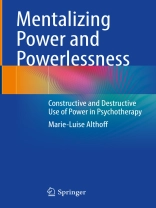In this book, the author discusses with a view to psychotherapeutic practice how power and the exercise of power can be used in a constructive sense. Spontaneously, people tend to associate the topic of power negatively. They mostly talk about their own powerlessness and the power of ‘those up there’, and very rarely about their own striving for power. It is undisputed that power and the exercise of power, as well as dealing with powerlessness, play an important role in psychotherapy. Nevertheless, the constructive and destructive aspects of power are still too little reflected. Here, there is a mentalization deficit on the part of both psychotherapists and patients. In this book questions are asked and suggestions for practice are developed.
Written for psychological psychotherapists, child and adolescent psychotherapists, family therapists, counselors, psychiatrists, physicians, students, and psychotherapists in training.
Mục lục
Introduction.- The development of the mentalizing ability.- Power and powerlessness.- what is it?- How do I as a psychotherapist recognize constructive and destructive use of power on both sides?- How do I as a psychotherapist deal with destructive use of power?.- How do I recognize the successful overcoming of a destructive power entanglement?.- Working through and healing: dealing with powerlessness and manifesting power.- The social dimension.
Giới thiệu về tác giả
Dr. phil. Marie-Luise Althoff, studied mathematics, psychology and education; she is a psychoanalyst, lecturer, supervisor and teaching therapist. She works in private practice in Bielefeld/Germany and teaches at several training institutes and universities. Areas of interest: secure frame, mentalizing and mentalization-based treatment, and couples therapy. She is a founding member of the German-speaking Mentalizing Network (MBT-DACH).












